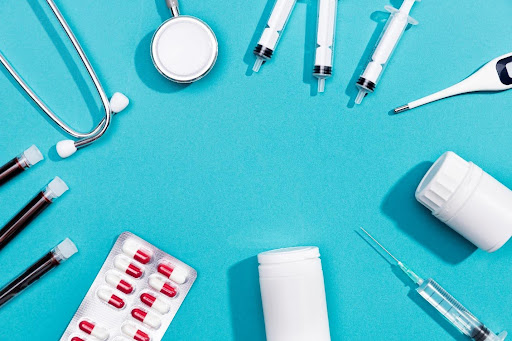Healthcare facilities require various types of essential medical supplies that are needed by every hospital for effective patient care and fast recovery. These supplies help in the treatment of patients, increase the recovery process and patient comfort, and reduce health problems. Doctors, tables, chairs, patient examination couches, BP apparatus, ECG machines, ultrasounds, and thermometers are the most important supplies for hospitals. Emergency medical supplies and other protective equipment protect individuals from various infections and health hazards. It is essential to have well-stocked medical supplies for routine check-ups or emergencies.
Long-lasting Medical Tools
A hospital must have a wide range of efficient, long-lasting, and durable medical equipment, such as stretchers, manual/electric wheelchairs, stethoscopes, blood pressure cuffs, thermometers, and x-ray machines. Other support equipment includes walkers, canes, crutches, hospital beds, traction equipment, pressure mattresses for patients, insulin supply pumps, nebulizer supplies, lifts for patients, oxygen supply tanks, and other essential devices. These items provide therapeutic benefits for disabled, ill, or injured patients. They are reliable and reusable, ensuring high-quality care for patients.
Clinical Diagnostic Devices
Diagnostic medical tools are the most important medical supplies for diagnosing a patient’s condition in any hospital. Tests are conducted based on symptoms to determine the patient’s condition using diagnostic equipment. The most basic diagnostic tools are patient scales, stethoscopes, Dopplers, and pulse oximeters. A lab should consist of analyzers, microscopes, incubators, and refrigerators. Orthopedic tools, x-ray machines, and ultrasound machines are important for maternity care. Other advanced diagnostic medical equipment like computed tomography (CT scans) and magnetic resonance imaging (MRI scanners) must also be available in a hospital.
Surgery Room Equipment
For a successful medical surgery or procedure, surgical room instruments and equipment are necessary medical supplies in a hospital. Surgical lights, tables, surgical units, cautery machines, anesthesia machines, warming fluids, sterilization and disinfection supplies, bandages, and wound care supplies are used in the operating room. Surgical gloves, caps, gowns, and glasses are personal protective equipment to ensure a clean, safe environment for patients and healthcare providers. These are important items to make a surgical operation successful for a hospital.
In-Hospital Nutritional Products
Nutritional products are necessary medical supplies for patient recovery in hospitals. Protein supplements can help patients heal wounds or pressure sores after surgery. Vitamins and mineral supplements can enhance the recovery process. Omega-3 supplements are beneficial for patients with heart-related issues and brain surgeries. For those patients who do not eat or absorb nutrients, enteral nutrition is provided directly to the stomach or small intestine for adults, infants, and newborns. Healthcare facilities can find Enteral Nutrition For Sale to ensure they have the required medical supplies for their patients. Specialized nutritional products are used to meet the nutritional needs of patients with diabetes, renal disease, and respiratory conditions.
Healthcare Storage and Logistics
It is essential for hospitals to have a storage and transport area for day-to-day activities. Medicines, surgical kits, diagnostic tools, and medical equipment are essential for the healthcare department. Storage carts and utility carts are important for storing and transporting medical supplies efficiently and for providing high-quality patient care.

